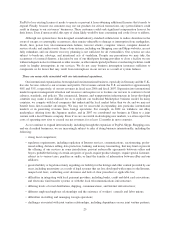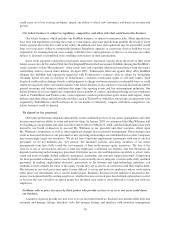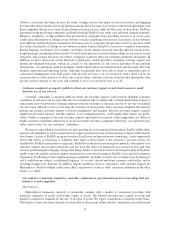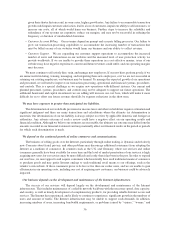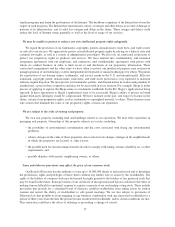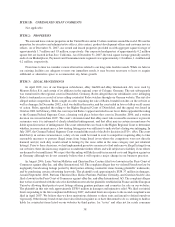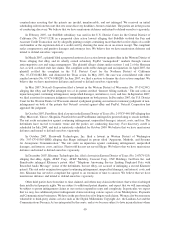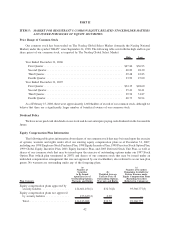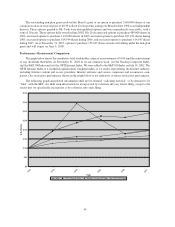eBay 2007 Annual Report Download - page 44
Download and view the complete annual report
Please find page 44 of the 2007 eBay annual report below. You can navigate through the pages in the report by either clicking on the pages listed below, or by using the keyword search tool below to find specific information within the annual report.• processors that provide online merchants the ability to offer their customers the option of paying for
purchases from their bank account, including Certegy, PayByTouch and TeleCheck, a subsidiary of First
Data, or to pay on credit, including Bill Me Later;
• providers of traditional payment methods, particularly credit cards, checks, money orders, and Automated
Clearing House transactions;
• issuers of stored value targeted at online payments, including VisaBuxx, NetSpend and GreenDot (formerly
known as Next Estate);
• Amazon Payments, which acts as a credit processor and can be linked to a personal bank account; and
• Google Checkout, which enables the online payment of merchants using credit cards.
Some of these competitors have longer operating histories, significantly greater financial, technical, mar-
keting, customer service and other resources, greater name recognition, or a larger base of customers in affiliated
businesses than PayPal. PayPal’s competitors may respond to new or emerging technologies and changes in
customer requirements faster and more effectively than PayPal. Some of these competitors may also be subject to
lesser licensing, anti-money laundering, and other regulatory requirements than PayPal, which is subject to
additional regulations based on its licensure as a bank in Luxembourg. They may devote greater resources to the
development, promotion, and sale of products and services than PayPal, and they may offer lower prices. For
example, Google Checkout extended its free payment processing promotion through February 1, 2008, and
currently offers free payments processing on transactions in an amount proportionate to certain advertising
spending with Google. Competing services tied to established banks and other financial institutions may offer
greater liquidity and engender greater consumer confidence in the safety and efficacy of their services than PayPal.
Overseas, PayPal faces competition from similar channels and payment methods. In each country, numerous
banks provide standard online credit card acquiring and processing services, and these banks typically have leading
market share. In addition, PayPal faces competition from Visa’s Visa Direct, MasterCard’s MoneySend, Royal Bank
of Scotland’s World Pay and ClickandBuy in the EU, NOCHEX, Moneybookers, NETeller and FirePay in the
United Kingdom, CertaPay and HyperWallet in Canada, Paymate and BPay in Australia, Alipay, YeePay, and 99Bill
in China and Inicis in South Korea. In addition, in certain countries, such as Germany and Australia, electronic
funds transfer is a leading method of payment for both online and offline transactions. As in the U.S., established
banks and other financial institutions that do not currently offer online payments could quickly and easily develop
such a service.
Some of PayPal’s competitors, such as Wells Fargo, First Data, American Express, and Royal Bank of
Scotland, also provide processing or foreign exchange services to PayPal. If PayPal were to seek to expand the
financial products that it offers, either alone or through a commercial alliance or an acquisition, these processing
and foreign exchange relationships could be negatively affected, or these competitors and other processors could
make it more difficult for PayPal to deliver its services.
Skype
The market for Skype’s products is also emerging, intensely competitive, and characterized by rapid
technological change. Many traditional telecommunications carriers, Internet companies, and cable providers
offer, or have indicated that they plan to offer, VoIP products or services that compete with the software Skype
provides. Microsoft recently announced the expansion of its Office communications suite to include VoIP. We
expect competitors to continue to improve the performance of their current products and introduce new products,
software, services, and technologies. If Skype’s competitors successfully introduce new products or enhance their
existing products, this could reduce the market for Skype’s products, increase price competition, or make Skype’s
products obsolete, which could lower Skype’s adoption rates, decrease its ability to attract new users or cause its
current users to migrate to a competing company. In addition, some of Skype’s competitors, such as telecommu-
nications carriers and cable television providers, are bundling services and products that Skype does not offer. These
include various forms of wireless communications, voice and data services, Internet access, and cable television.
This form of bundling may put Skype at a competitive disadvantage if these providers can combine a variety of
service offerings at a single attractive price. Furthermore, competitors may choose to make their services
34



